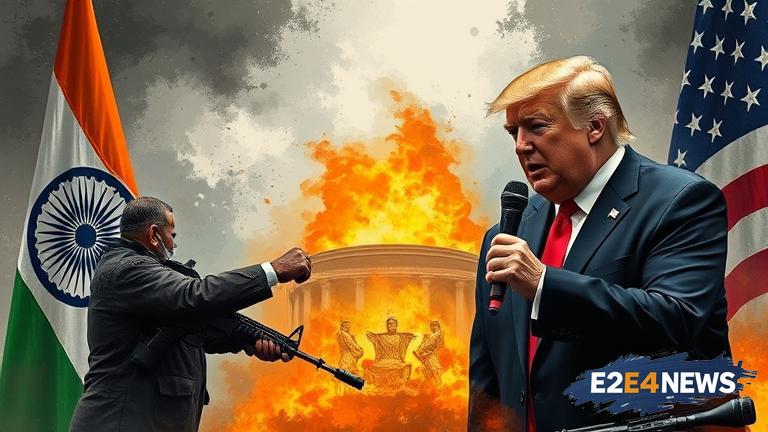In a recent development, Jairam Ramesh, a senior Indian politician, has slammed the Centre over US President Trump’s claim of brokering a ceasefire between India and Pakistan. This marks the 26th time India has disputed the statement, which has been a point of contention between the two nations. The issue began when President Trump claimed that he had helped to facilitate a ceasefire between India and Pakistan, which India has consistently denied. The Indian government has maintained that there was no involvement from the US in the ceasefire negotiations. Jairam Ramesh, a member of the Indian National Congress, has been vocal in his criticism of the Centre’s handling of the situation. He has accused the government of failing to effectively communicate with the US and of allowing President Trump to make false claims. The dispute has highlighted the complexities of international diplomacy and the challenges of navigating relationships between nations. India and Pakistan have a long and complex history, with tensions between the two countries often running high. The ceasefire in question was agreed upon in February, and while it has held, there have been occasional skirmishes along the Line of Control. The US has been keen to play a role in mediating the conflict, but India has been resistant to external involvement. The Indian government has maintained that the issue is a bilateral one, and that it is capable of resolving its differences with Pakistan without external assistance. Despite this, President Trump has continued to claim that he played a role in brokering the ceasefire. The claim has been widely disputed, with many in India viewing it as an attempt to boost the US president’s reputation. The issue has also sparked a debate about the role of external powers in regional conflicts. Some have argued that external involvement can help to reduce tensions and facilitate dialogue, while others believe that it can exacerbate the situation and create new challenges. The dispute has also highlighted the importance of effective communication in international diplomacy. The Indian government has been accused of failing to clearly communicate its position to the US, which has led to confusion and misinformation. Jairam Ramesh has called for greater transparency and clarity in the government’s dealings with the US. The issue is likely to continue to be a point of contention between India and the US, with implications for the relationship between the two nations. The Indian government will need to navigate the situation carefully, balancing its desire for sovereignty with the need for effective diplomacy. The US will also need to be mindful of its role in the region, avoiding actions that could be seen as intrusive or heavy-handed. As the situation continues to evolve, it is likely that there will be further developments and challenges. The Indian government will need to be prepared to respond to these challenges, while also working to maintain good relations with the US. The dispute has also sparked a wider debate about the role of the US in global affairs. Some have argued that the US is seeking to exert its influence in the region, while others believe that it is genuinely seeking to promote peace and stability. The issue is complex, and there are likely to be many different perspectives on the matter. Ultimately, the key to resolving the dispute will be effective communication and a willingness to listen to different perspectives. By working together and engaging in open and honest dialogue, India and the US can work to build a stronger and more constructive relationship. The dispute has also highlighted the importance of a free and independent media. The Indian media has played a crucial role in highlighting the discrepancies in President Trump’s claims, and in holding the government to account. A free press is essential for a healthy democracy, and it is crucial that it is allowed to operate without interference or censorship. The issue has also sparked a debate about the role of social media in international diplomacy. Social media has become an increasingly important tool for governments and politicians, but it can also be used to spread misinformation and propaganda. The Indian government will need to be mindful of the potential risks and challenges of social media, and to work to ensure that it is used in a responsible and constructive manner. The dispute has also highlighted the importance of building trust and credibility in international relations. The Indian government will need to work to build trust with the US, and to demonstrate its commitment to honest and transparent diplomacy. By doing so, it can help to build a stronger and more constructive relationship, and to promote peace and stability in the region.
